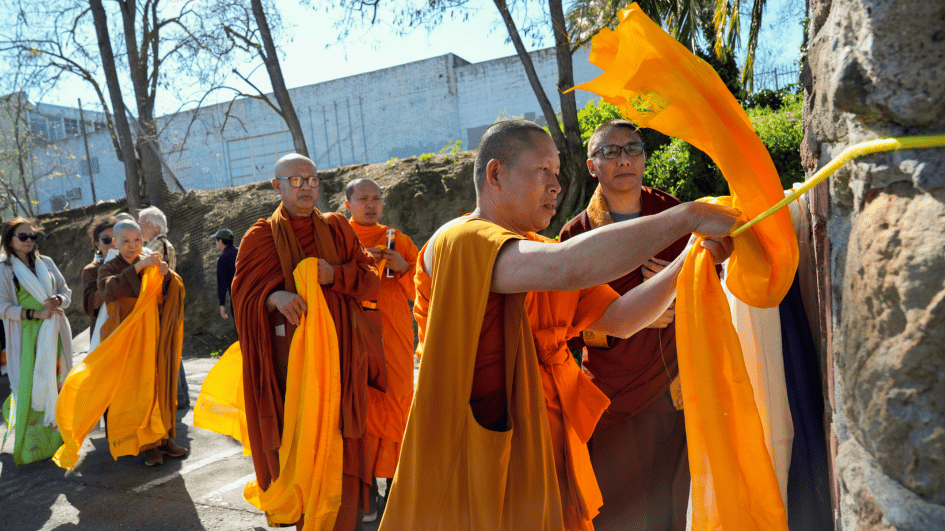
For one afternoon in the U.S. city of Antioch located in the state of California, the main street and tranquil riverbank was surrounded by the fragrance of burning incense, paired with the sound of Buddhist and Tao chants. Their cumulative calming energy was meant to be a balm of sorts to soothe the racial and religious hate that cast a shadow on Antioch's legacy.
Antioch’s dark past, specifically its horrific mistreatment of early Chinese immigrants, motivated about 200 Buddhists to undertake a recent pilgrimage to the city of about 115,000, tucked deep in the delta that drains into the San Francisco Bay.
Their goal was to supplant the negative with the positive by reconciling a dreadful past and anxiety-filled present, both time periods when Asian Americans nationwide have faced hate and discrimination, with the hope for a more egalitarian and harmonious future.
In the 1800s, thousands of Chinese immigrants came to the area during the gold rush to work in mines, and build railroads and levees. Those who lived in Antioch were subject to sundown laws and used secret tunnels to commute to and from work, according to local newspaper reports.
Eventually, the city’s Chinatown spanning a couple of city blocks, which also housed a Buddhist/Tao temple where new immigrants congregated, was burned down.
On Saturday, the group of Buddhists gathered for the pilgrimage, an event they titled “May We Gather." It was intentionally scheduled on the third anniversary of the Atlanta mass shooting when a white gunman targeted female employees at Asian American massage parlors.
Duncan Williams, a Soto Zen priest of Japanese descent and one of the event’s organizers, said the Atlanta killings bore eerie similarity to Antioch in 1876 when raging locals burned down the homes of Chinese women.
In 2021, Antioch became the first U.S. city to issue a public apology for the mistreatment of early Chinese immigrants during the gold rush.
Williams, who also is a religion professor at the University of Southern California, said event organizers desired not just a political reaction, but “a Buddhist response that draws on our teachings and practice,” which aims to honor ancestors and heal racial trauma, past and present.
So in Antioch’s El Campanil Theatre, a gathering of Buddhist monks and leaders from across the diaspora engaged in a process of “karmic healing.” They offered chants and prayers at the altar of the thousand-armed Guan Yin, the goddess of mercy and compassion. Four tablets rested at the altar bearing the names of victims of hate and violence.
Grace Song, an ordained minister and a department chair at the Won Institute of Graduate Studies in Warminster, Pennsylvania, said she had never been part of a peace-building event that celebrated diverse Buddhist traditions until now.
Khenpo Paljor, a Tibetan lama from Des Moines, Iowa, offered prayers at the Birthplace of Antioch marker erected in 1850 by the first European settlers. Here, attendees placed multi-colored Tibetan kata, which are traditional prayer scarves. Williams said the colored scarves reflect a Buddhist scripture that speaks of pure souls as colored lights shining in unison, with none canceling out the others.
For Cristina Moon, a Honolulu-based Zen priest, karmic healing is the process of changing “our relationship to what happened and the ways in which we can control how to act in the future.”
“It's important we recognize what happened and acknowledge it's uncomfortable,” she said. “It's about not getting stuck in a painful past but moving forward in a positive manner.”
Bhikkhunis (Buddhist nuns) Hyokeun and Hyung Jeon from the Korean Borisa Zen Center in Las Vegas, offered a white, ceramic lotus to Guan Yin during the ceremony.
“The lotus flower is sacred in Buddhism because it maintains its purity and beauty despite growing in the mud,” Hyokeun said. “Hatred cannot solve hatred, only compassion can.”
Tao Master Eman, a priest from the First Taoist Foundation in Arcadia, California, performed a ritual on the riverbank as participants walked silently around the block where Chinatown and its temple stood nearly 150 years ago. Eman said he called on traumatized spirits and comforted them, so they can move on to a better place.
One of the attendees was Sasanna Yee, who has been speaking out about anti-Asian hate since her 88-year-old grandmother, Yik Oi Huang, was fatally beaten in January 2019 in a San Francisco park.
Yee, who offered prayers and a memorial tablet at the altar where her grandmother was memorialized, saw the event as healing.
“This is a really beautiful solution to move us into the future where we connect over shared hopes and dreams,” she said.